人教版八年级下册Unit 8 Have you read Treasure Island yet?语法精讲精练(共52张PPT)
文档属性
| 名称 | 人教版八年级下册Unit 8 Have you read Treasure Island yet?语法精讲精练(共52张PPT) | 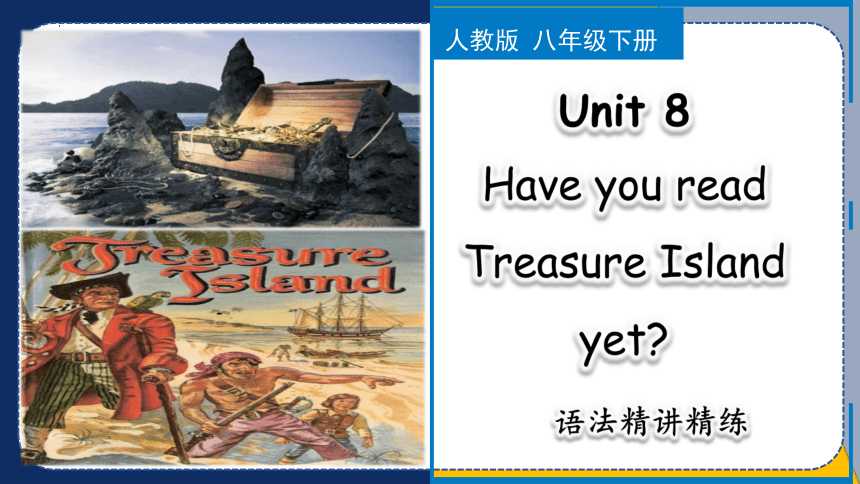 | |
| 格式 | pptx | ||
| 文件大小 | 13.4MB | ||
| 资源类型 | 教案 | ||
| 版本资源 | 人教新目标(Go for it)版 | ||
| 科目 | 英语 | ||
| 更新时间 | 2023-04-20 15:29:42 | ||
图片预览

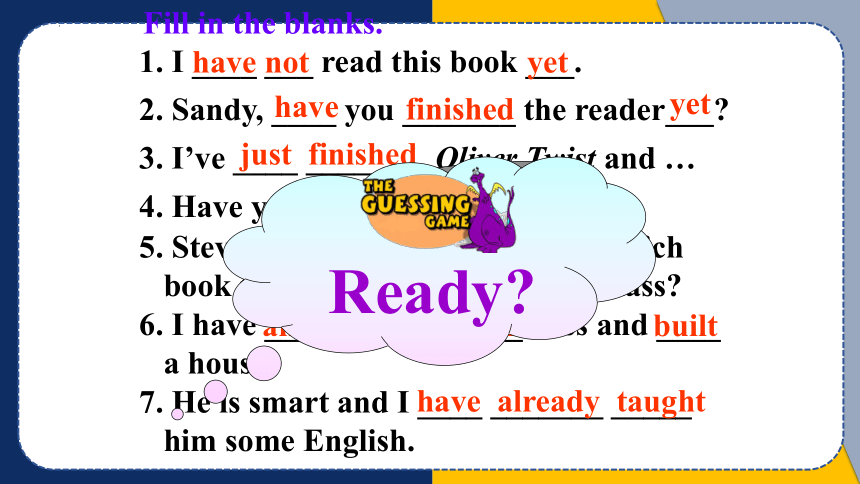
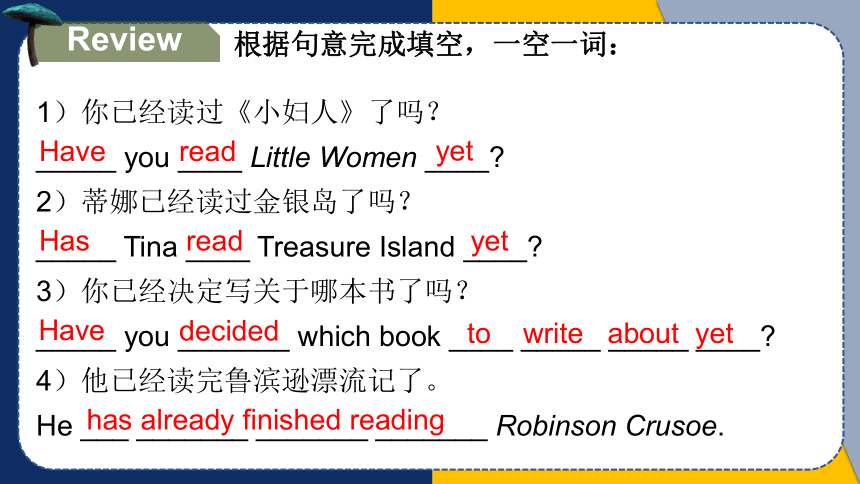
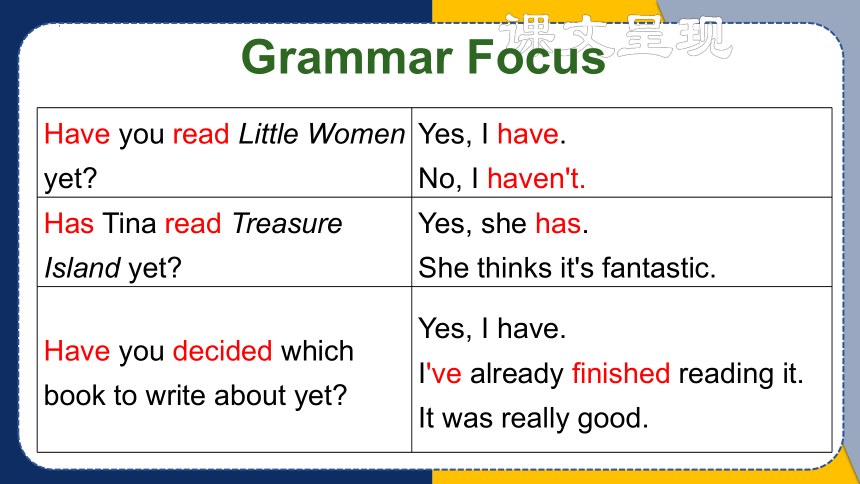
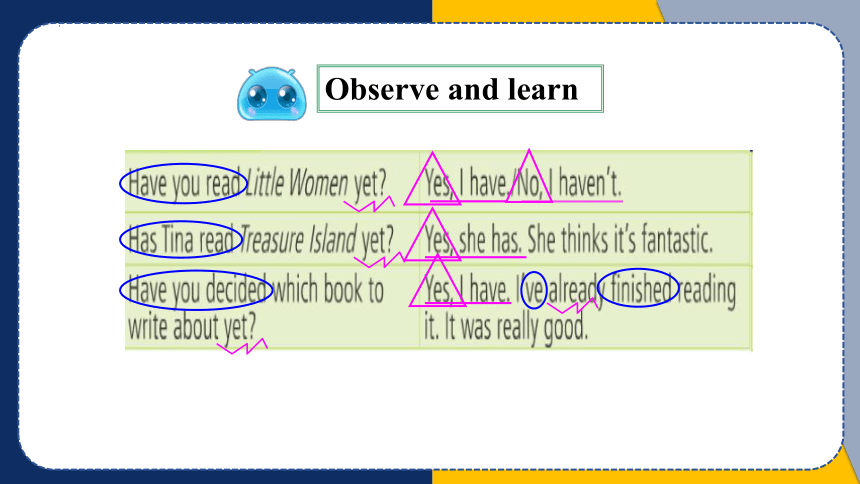
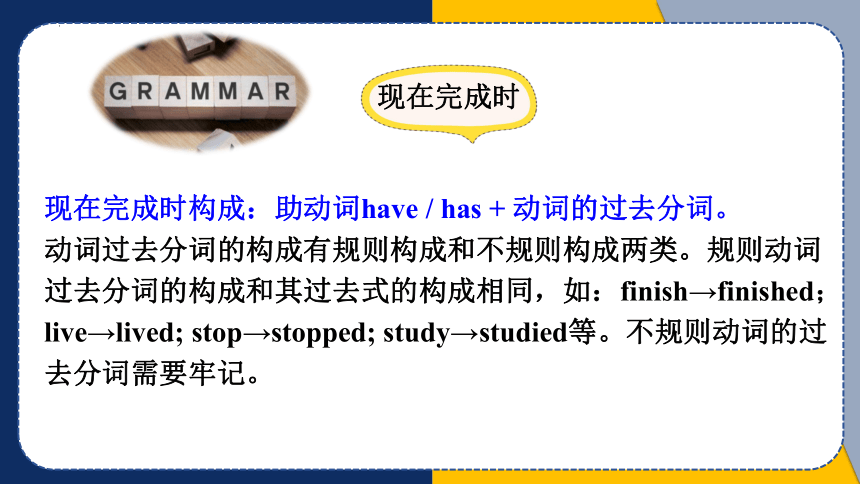
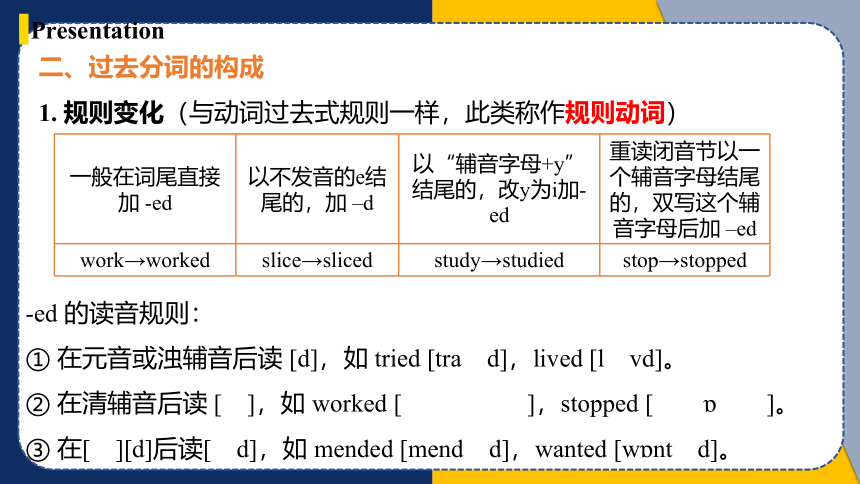
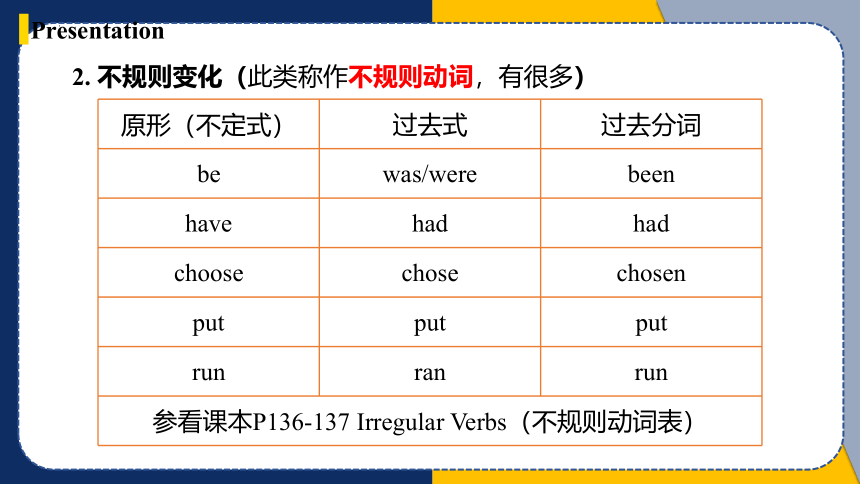
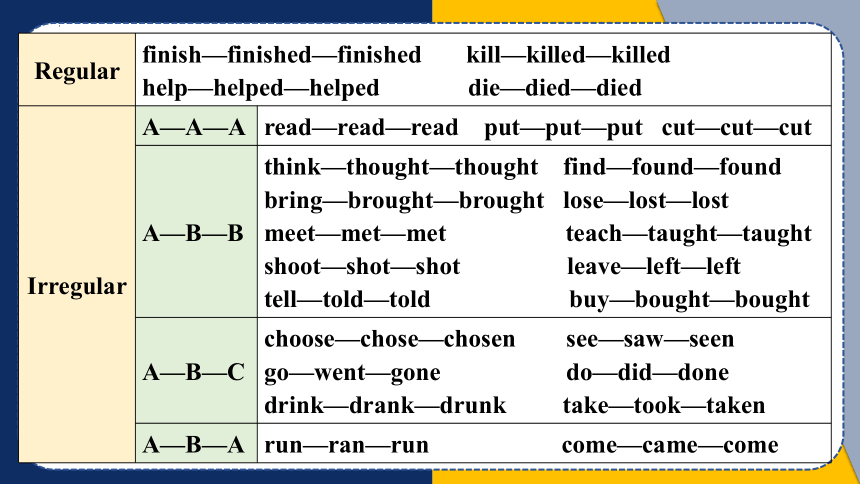
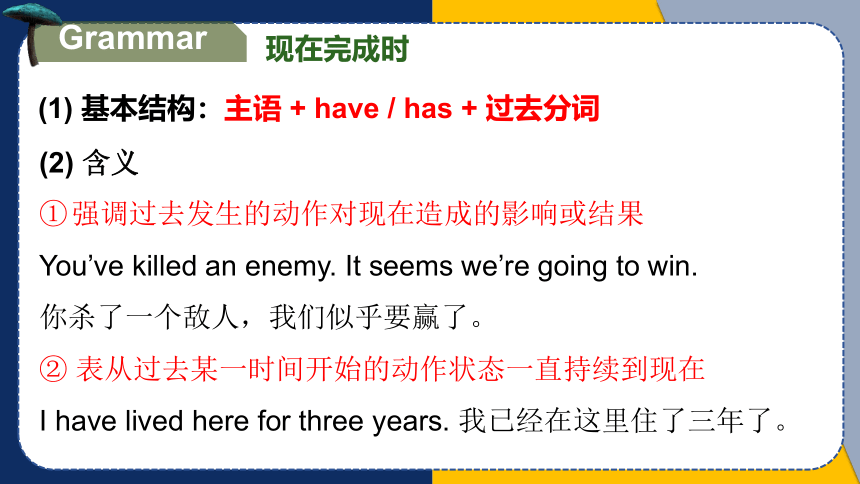
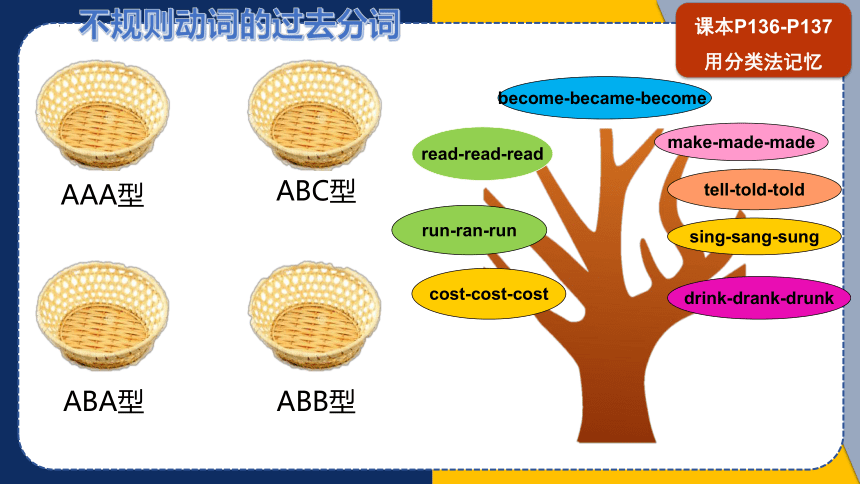
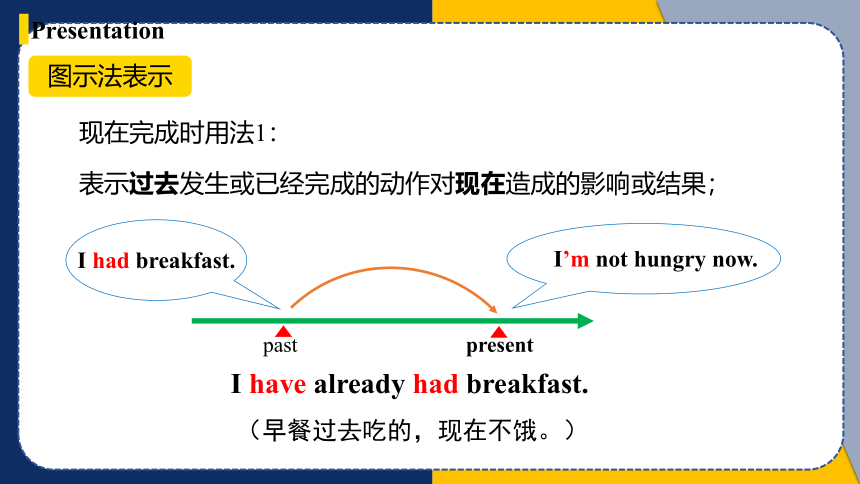
文档简介
人教版 八年级下册
Unit 8
Have you read Treasure Island yet
语法精讲精练
have already taught
just finished
have not yet
have
finished
yet
heard of
yet
have decided yet
go
Ready
Fill in the blanks.
Review
根据句意完成填空,一空一词:
1)你已经读过《小妇人》了吗?
_____ you ____ Little Women ____
2)蒂娜已经读过金银岛了吗?
_____ Tina ____ Treasure Island ____
3)你已经决定写关于哪本书了吗?
_____ you _______ which book ____ _____ _____ ____
4)他已经读完鲁滨逊漂流记了。
He ___ _______ _______ _______ Robinson Crusoe.
Have
read
yet
read
yet
Has
Have
decided
to write about yet
has already finished reading
Grammar Focus
Have you read Little Women yet Yes, I have.
No, I haven't.
Has Tina read Treasure Island yet Yes, she has.
She thinks it's fantastic.
Have you decided which book to write about yet Yes, I have.
I've already finished reading it. It was really good.
Observe and learn
现在完成时构成:助动词have / has + 动词的过去分词。
动词过去分词的构成有规则构成和不规则构成两类。规则动词过去分词的构成和其过去式的构成相同,如:finish→finished;live→lived; stop→stopped; study→studied等。不规则动词的过去分词需要牢记。
现在完成时
二、过去分词的构成
1. 规则变化(与动词过去式规则一样,此类称作规则动词)
Presentation
一般在词尾直接加 -ed 以不发音的e结尾的,加 –d 以“辅音字母+y”结尾的,改y为i加-ed 重读闭音节以一个辅音字母结尾的,双写这个辅音字母后加 –ed
work→worked slice→sliced study→studied stop→stopped
-ed 的读音规则:
① 在元音或浊辅音后读 [d],如 tried [tra d],lived [l vd]。
② 在清辅音后读 [ ],如 worked [ ],stopped [ ]。
③ 在[ ][d]后读[ d],如 mended [mend d],wanted [w nt d]。
2. 不规则变化(此类称作不规则动词,有很多)
Presentation
原形(不定式) 过去式 过去分词
be was/were been
have had had
choose chose chosen
put put put
run ran run
参看课本P136-137 Irregular Verbs(不规则动词表)
Regular finish—finished—finished kill—killed—killed help—helped—helped die—died—died
Irregular A—A—A read—read—read put—put—put cut—cut—cut
A—B—B think—thought—thought find—found—found
bring—brought—brought lose—lost—lost
meet—met—met teach—taught—taught
shoot—shot—shot leave—left—left
tell—told—told buy—bought—bought
A—B—C choose—chose—chosen see—saw—seen
go—went—gone do—did—done
drink—drank—drunk take—took—taken
A—B—A run—ran—run come—came—come
现在完成时
(2) 含义
强调过去发生的动作对现在造成的影响或结果
You’ve killed an enemy. It seems we’re going to win.
你杀了一个敌人,我们似乎要赢了。
② 表从过去某一时间开始的动作状态一直持续到现在
I have lived here for three years. 我已经在这里住了三年了。
(1) 基本结构:主语 + have / has + 过去分词
Grammar
AAA型
不规则动词的过去分词
ABA型
ABB型
ABC型
become-became-become
tell-told-told
run-ran-run
cost-cost-cost
read-read-read
make-made-made
sing-sang-sung
drink-drank-drunk
课本P136-P137
用分类法记忆
Presentation
现在完成时用法1:
表示过去发生或已经完成的动作对现在造成的影响或结果;
past
I had breakfast.
I’m not hungry now.
present
I have already had breakfast.
(早餐过去吃的,现在不饿。)
图示法表示
Presentation
现在完成时用法2:
表示过去某一时间开始并一直持续到现在的动作或状态。
图示法表示
past
I moved here
in 1990.
I still live here.
present
I have lived here for 30 years.
(30年来一直生活在这里)
already 与 yet 在现在完成时中的用法解析
Presentation
yet 常用于否定句或疑问句句末。用于表示某事尚未发生或某情形尚未出现,或用于询问某事是否已经发生。 He hasn’t finished the book yet.
Have you seen him yet
already 常用于肯定句中,用于强调某事已经开始出现;也可用于疑问句中,表示因某事的发生早于预料而感到吃惊。 They have already known each other.
Have you eaten all that food already
现在完成时还可以表示过去某一时间开始并一直持续到现在的动作或状态,常与“for + 时间段”或“since + 时间点 / 从句”连用,这时要用延续性动词。
They have worked in this company for 30 years.
He has been in the army since 2016.
(错:He has joined the army since 2016.)
【特别提醒】如果要对 for 或 since 短语提问,疑问词用 how long。
— How long have you lived in this area
— For at least 10 years.
Presentation
注意: 现在完成时与for或since引导的时间状语连用时,主句动词必须是延续性动词。
I’ve fallen in love with reading since I was a child.
She has died for three years.
I’ve been in love with him since I was 18.
They’ve waited for me for an hour.
×
×
√
√
2. —Your new watch is so nice! When did you buy it
—In April. I____ it for two months. (黄冈)
A. have had B. had C. have bought D. bought
1. I ____ in the city since I left school. (天津)
A. live B. will live
C. was living D. have lived
buy是瞬间性动词
Exercises
3. William Shakespeare ____ for 400 years, but his works still have great influence today. (青岛)
A. died B. was dying
C. has died D. has been dead
4. —The boy misses his parents very much.
— So he does. They __ the hometown for nearly two years.
A. have left B. will leave C. have been away from
现在完成时标志词:
现在完成时常与already, yet, ever, never, before, just等连用。already常用于肯定句中, yet常用于否定句和疑问句中。含有already的肯定句变否定句或疑问句时, 要将already变为yet, 并置于句末。
e.g. The rain has already stopped.
→ The rain hasn’t stopped yet.
→ Has the rain stopped yet
(4) 现在完成时的结构句型
肯定句 主语+have/has+过去分词+其他.
否定句 主语+have/has+not+过去分词+其他.
一般疑问句 Have / Has+主语+过去分词+其他
Yes, 主语+have/has.
No, 主语+have/has not.
特殊疑问 特殊疑问词+have/has+主语+过去分词…
注意:变否定句和疑问句,动词都用过去分词,不用还原!
e.g. I have got a letter from my aunt. (肯定句)
→I haven’t got a letter from my aunt. (否定句)
→—Have you got a letter from your aunt (一般疑问句)
—Yes, I have. / No, I haven’t. (简略回答)
① 我已经完成了我的家庭作业。
② 他们学10年英语了。
③ 她刚收到了我的来信。(hear from)
翻译句子再变成否定句和一般疑问句,
并做肯定及否定回答:
Exercises
① 我已经完成了我的家庭作业。
I have already finished my homework.
I haven’t finished my homework yet.
Have you finished your homework yet
Yes, I have. / No, I haven’t.
翻译句子再变成否定句和一般疑问句,
并做肯定及否定回答:
② 他们学10年英语了。
They have learned English for ten years.
They haven’t learned English for ten years.
Have they learned English for ten years?
Yes, they have./ No, they haven’t.
翻译句子再变成否定句和一般疑问句,
并做肯定及否定回答:
③ 她刚收到了我的来信。(hear from)
She has just heard from me.
She hasn’t heard from me yet.
Has she heard from me yet
Yes, she has./ No, she hasn’t.
翻译句子再变成否定句和一般疑问句,
并做肯定及否定回答:
1. —Look! Somebody________ the lights.
—Well, it wasn’t me. I didn’t do it. (连云港)
A. turns off B. is turning off
C. was turning off D. has turned off
2. —Peter, you speak Chinese so well.
— Thank you. I ____ Chinese since I came here in 2013.
A. will learn B. learned
C. have learned D. learn
Exercises
A short video to understand the present perfect.
点击, 播放视频
(5) 现在完成时与一般过去时的区别
他吃了饭吗?
Did he eat dinner
Has he eaten dinner
暗含现在的情况,他吃没吃对现在的事情有影响,如吃饭不能抽血
只是单纯的询问一个事实,和现在无关
注意:现在完成时不能与单纯表示过去的时间状语连用,如yesterday, last week, in 2002, three days ago等
现在完成时
一般过去时
e.g. I went home at 10:00 yesterday. 我昨天十点回家的。
I have got home now. 现在我已经到家了。
I have already finished my homework. 我已经写完作业了。
I finished it an hour ago. 我是一个小时前写完的。
强调这一动作与现在的关系,如对现在产生的结果、影响等
只表示过去的事实,不表示和现在的关系
3. 日常对话中通常两种时态配合使用,开始提到一件事做没做或发生过时用现在完成时,说起这件事具体情形时用一般过去时。
— Have you been to Japan
— Yes, I have. I went there last year.
— Who did you go with
— …
Presentation
【语境应用】按要求完成下列各题。
1) Jane has met a lot of famous people. (改为一般疑问句)
_______ Jane _______ a lot of famous people
2) He has already eaten all the food on the plate. (改为否定句)
He _______ _______ all the food on the plate _______.
3) —Has Peter driven a car before (作肯定回答)
—_______, _______ _______.
4) —Mary, have you got a job yet (作否定回答)
—_______, _______ _______.
Has met
hasn't eaten yet
Yes he has
No I haven't
1. —Would you like to see the movie Changjin Lake this evening
—Oh, it’s a good movie. But I _________ it already.
(2022湖北鄂州)
A. saw B. have seen C. see D. will see
2. —Congratulations! You ________ big progress in the last three years.
—Thank you, Mr. Li. I’ll never forget the good times in Junior High. (2022湖北武汉)
A. make B. made C. have made D. will make
B
C
4. I joined the book club last month and I ______ five books already. (2021贵州毕节)
A. am reading B. have read C. will read D. read
B
5. —Would you like something to drink
—No, thanks. I ______ some tea already. (2021 湖北鄂州)
A. have drunk B. was drinking C. will drink D. drink
A
3. Sorry, I ________ a mistake. Let me correct it. (2022河北)
A. will make B. am making C. was making D. have made
D
1. A: Would you like something to drink
B: No, thanks. ______________________. (just/drink some tea)
2. A: I heard you lost your key. ___________________ (find)
B: No, not yet.
I’ve just drunk some tea
Have you found it yet
Use the words in brackets to complete the conversations.
3. A: Do you know when Tom is leaving
B: _______________________. (already/leave)
A: When _________________ (leave)
B: This morning.
4. A: Is your sister going to the movies with us tonight
B: No. __________________________. (already/see the film)
5. A: What do your parents think about our plan
B: I ___________________________. (not / tell them / yet)
Tom/He has already left
did he leave
She has already seen the film
have not/haven’t told them yet
Sally ______ (love) reading. In the morning, she reads the newspaper and in the evening she reads books. She ______ already ______ (read) more than 100 different books! Her favorite kind of books is science fiction. She is interested in science and technology and loves to imagine what the world ________ (be) like in 50 years.
loves
has
read
will be
Fill in the blanks with the correct forms of the words in the brackets.
She ________ (finish) reading a book about robots last week and _________ (write) a book report about it next week for her French class. Every time she is in the library, Sally looks at the many books she ____________ (not read) yet and she can’t wait to read them!
finished
will write
has not read
can't wait to do sth. 迫不及待去做某事
I can’t wait to tell her the good news.
我等不及要告诉她这个好消息。
can't help doing sth. = can’t help but do sth.
情不自禁地做某事
I can’t help feeling that there has been a mistake.
我不由自主地觉得什么地方搞错了。
Language Points
—I always can’t help ________ TV plays with my
mobile phone when I’m studying.
— It’s not a good habit. You are supposed to ____ it.
A. watching; correcting B. watch; correct
C. watch; correcting D. watching; correct
can’t help doing sth. 情不自禁做某事
be supposed to do sth. 应该去做某事
Complete the chart with information about you and a friend.
A: What books have you already read
B: I’ve already read Tom Sawyer and Harry Potter.
A: What do you think of them
B: Well, I think Harry Potter was exciting, but Tom Sawyer was a bit boring.
Experiences You Your friend Comments
Books I have already read
Movies I have already seen
Songs I have already heard
I’ve already read the book _______________. I think it’s _____________. My friend ____________ has read a book called ______________. He/She thinks it’s ____________ and he/she …
1. 表示过去发生或已经完成的动作对现在造成的影响或结果,常与 already,just,yet,ever,never,before,so far,recently,in the past / last ... years / months 等连用或根据上下文语境判断。
助动词have/has+动词的过去分词
现在完成时
3. have been to 到过某地(现在已经回来),常有表示次数的词语 once,twice,three times等;
have gone to 去某地了(还没回来)。
2. 表示过去某一时间开始并一直持续到现在的动作或状态,也许还要持续下去,常用于延续性动词,与for+时间段或since+时间点或since引导的时间状语从句连用。
一、单项选择
(安徽中考)— It’s ten years since we came here.
— How time flies! We _____ in China for so long.
A. work B. worked C. will work D. have worked
(贵阳中考)Today, all the erhu masters play and praise Erquan Yingyue. It _____ one of China’s national treasures.
becomes B. became C. has become
Miss Brown, we _____ cleaning our classroom. Can we go home now
A. finish B. finishing C. are finished D. have finished
1
2
D
C
3
D
Exercises
— Your new watch is so nice! When did you buy it
— In April. I______ it for two months.
A. have had B. had C. have bought D. bought
— Has your sister finished reading ________
— Yes. She has________ finished.
A. yet; yet B. yet; already
C. already; yet D. already; already
4
5
A
B
Exercises
She __________(not read) the book yet.
________ you ________(decide) which book to buy yet
Tom won't go to the cinema with us because he ________ already ________ (see) the film.
David hasn't ________(finish) ________(read) Harry Potter yet.
We ________ just ________(clean) the classroom.
I ________(lend) my bike to her yesterday, but she ____________ (not give) it back to me yet.
二、用所给单词的适当形式填空。
hasn’t read
1
2
3
4
Have
has
seen
finished
have
cleaned
5
decided
reading
lent
hasn’t given
6
7. _________ you _________(read) the newspapers yet
8. They _________ already _________(arrive) at that village.
9. His father _________(leave) home just now. You can call him.
10. My mother _________(tell) me about it before.
11. This American boy _________(try) Beijing duck twice.
12. Linda’s brother _________(use) the tool to move the stone in a minute.
13. She _________(speak) French well, so she can teach us French.
Have read
have arrived
left
has told
has tried
will use
speaks
根据对话内容及所给汉语提示,写出所缺内容,每空词数不限。
1. —Betty, would you like to see the movie A Little Red Flower with me tonight
—No problem. Although I __________________________
__________(已经看过这部电影了), I still want to see it again.
2. —I have finished my English report. How about Peter
—Well, he _______________________________(还没开始做).
have already seen / watched
hasn't started / begun to do it yet
this movie
3. —What's in the newspaper today, Susan
—I don't know. I ________________ (还没读).
4. —Is Ann still at the bank
—No, she _______________________________(刚刚回来).
haven't read it yet
has just come / been back / returned
根据括号内要求完成各题,每空一词(含缩略形式)。
1. Last night I learned ten English words. (用so far替换last night改写句子)
So far I ________ ________ ten English words.
2. His friends have prepared for his birthday. (改为一般疑问句)
________ his friends ________ for his birthday
3. Bill has already written an article for the magazine. (改为否定句)
Bill ________ ________ an article for the magazine ________.
have learned
Have prepared
hasn’t written yet
4. Have your parents left the city (补全肯定答语)
Yes, ________ ________.
5. Has Ms. Jones decided to go to Beijing on vacation
(补全否定答语)
No, ________ ________.
they have
she hasn’t
Make sentences using the present perfect tense with already and yet. (at least 8 sentences)
Unit 8
Have you read Treasure Island yet
语法精讲精练
have already taught
just finished
have not yet
have
finished
yet
heard of
yet
have decided yet
go
Ready
Fill in the blanks.
Review
根据句意完成填空,一空一词:
1)你已经读过《小妇人》了吗?
_____ you ____ Little Women ____
2)蒂娜已经读过金银岛了吗?
_____ Tina ____ Treasure Island ____
3)你已经决定写关于哪本书了吗?
_____ you _______ which book ____ _____ _____ ____
4)他已经读完鲁滨逊漂流记了。
He ___ _______ _______ _______ Robinson Crusoe.
Have
read
yet
read
yet
Has
Have
decided
to write about yet
has already finished reading
Grammar Focus
Have you read Little Women yet Yes, I have.
No, I haven't.
Has Tina read Treasure Island yet Yes, she has.
She thinks it's fantastic.
Have you decided which book to write about yet Yes, I have.
I've already finished reading it. It was really good.
Observe and learn
现在完成时构成:助动词have / has + 动词的过去分词。
动词过去分词的构成有规则构成和不规则构成两类。规则动词过去分词的构成和其过去式的构成相同,如:finish→finished;live→lived; stop→stopped; study→studied等。不规则动词的过去分词需要牢记。
现在完成时
二、过去分词的构成
1. 规则变化(与动词过去式规则一样,此类称作规则动词)
Presentation
一般在词尾直接加 -ed 以不发音的e结尾的,加 –d 以“辅音字母+y”结尾的,改y为i加-ed 重读闭音节以一个辅音字母结尾的,双写这个辅音字母后加 –ed
work→worked slice→sliced study→studied stop→stopped
-ed 的读音规则:
① 在元音或浊辅音后读 [d],如 tried [tra d],lived [l vd]。
② 在清辅音后读 [ ],如 worked [ ],stopped [ ]。
③ 在[ ][d]后读[ d],如 mended [mend d],wanted [w nt d]。
2. 不规则变化(此类称作不规则动词,有很多)
Presentation
原形(不定式) 过去式 过去分词
be was/were been
have had had
choose chose chosen
put put put
run ran run
参看课本P136-137 Irregular Verbs(不规则动词表)
Regular finish—finished—finished kill—killed—killed help—helped—helped die—died—died
Irregular A—A—A read—read—read put—put—put cut—cut—cut
A—B—B think—thought—thought find—found—found
bring—brought—brought lose—lost—lost
meet—met—met teach—taught—taught
shoot—shot—shot leave—left—left
tell—told—told buy—bought—bought
A—B—C choose—chose—chosen see—saw—seen
go—went—gone do—did—done
drink—drank—drunk take—took—taken
A—B—A run—ran—run come—came—come
现在完成时
(2) 含义
强调过去发生的动作对现在造成的影响或结果
You’ve killed an enemy. It seems we’re going to win.
你杀了一个敌人,我们似乎要赢了。
② 表从过去某一时间开始的动作状态一直持续到现在
I have lived here for three years. 我已经在这里住了三年了。
(1) 基本结构:主语 + have / has + 过去分词
Grammar
AAA型
不规则动词的过去分词
ABA型
ABB型
ABC型
become-became-become
tell-told-told
run-ran-run
cost-cost-cost
read-read-read
make-made-made
sing-sang-sung
drink-drank-drunk
课本P136-P137
用分类法记忆
Presentation
现在完成时用法1:
表示过去发生或已经完成的动作对现在造成的影响或结果;
past
I had breakfast.
I’m not hungry now.
present
I have already had breakfast.
(早餐过去吃的,现在不饿。)
图示法表示
Presentation
现在完成时用法2:
表示过去某一时间开始并一直持续到现在的动作或状态。
图示法表示
past
I moved here
in 1990.
I still live here.
present
I have lived here for 30 years.
(30年来一直生活在这里)
already 与 yet 在现在完成时中的用法解析
Presentation
yet 常用于否定句或疑问句句末。用于表示某事尚未发生或某情形尚未出现,或用于询问某事是否已经发生。 He hasn’t finished the book yet.
Have you seen him yet
already 常用于肯定句中,用于强调某事已经开始出现;也可用于疑问句中,表示因某事的发生早于预料而感到吃惊。 They have already known each other.
Have you eaten all that food already
现在完成时还可以表示过去某一时间开始并一直持续到现在的动作或状态,常与“for + 时间段”或“since + 时间点 / 从句”连用,这时要用延续性动词。
They have worked in this company for 30 years.
He has been in the army since 2016.
(错:He has joined the army since 2016.)
【特别提醒】如果要对 for 或 since 短语提问,疑问词用 how long。
— How long have you lived in this area
— For at least 10 years.
Presentation
注意: 现在完成时与for或since引导的时间状语连用时,主句动词必须是延续性动词。
I’ve fallen in love with reading since I was a child.
She has died for three years.
I’ve been in love with him since I was 18.
They’ve waited for me for an hour.
×
×
√
√
2. —Your new watch is so nice! When did you buy it
—In April. I____ it for two months. (黄冈)
A. have had B. had C. have bought D. bought
1. I ____ in the city since I left school. (天津)
A. live B. will live
C. was living D. have lived
buy是瞬间性动词
Exercises
3. William Shakespeare ____ for 400 years, but his works still have great influence today. (青岛)
A. died B. was dying
C. has died D. has been dead
4. —The boy misses his parents very much.
— So he does. They __ the hometown for nearly two years.
A. have left B. will leave C. have been away from
现在完成时标志词:
现在完成时常与already, yet, ever, never, before, just等连用。already常用于肯定句中, yet常用于否定句和疑问句中。含有already的肯定句变否定句或疑问句时, 要将already变为yet, 并置于句末。
e.g. The rain has already stopped.
→ The rain hasn’t stopped yet.
→ Has the rain stopped yet
(4) 现在完成时的结构句型
肯定句 主语+have/has+过去分词+其他.
否定句 主语+have/has+not+过去分词+其他.
一般疑问句 Have / Has+主语+过去分词+其他
Yes, 主语+have/has.
No, 主语+have/has not.
特殊疑问 特殊疑问词+have/has+主语+过去分词…
注意:变否定句和疑问句,动词都用过去分词,不用还原!
e.g. I have got a letter from my aunt. (肯定句)
→I haven’t got a letter from my aunt. (否定句)
→—Have you got a letter from your aunt (一般疑问句)
—Yes, I have. / No, I haven’t. (简略回答)
① 我已经完成了我的家庭作业。
② 他们学10年英语了。
③ 她刚收到了我的来信。(hear from)
翻译句子再变成否定句和一般疑问句,
并做肯定及否定回答:
Exercises
① 我已经完成了我的家庭作业。
I have already finished my homework.
I haven’t finished my homework yet.
Have you finished your homework yet
Yes, I have. / No, I haven’t.
翻译句子再变成否定句和一般疑问句,
并做肯定及否定回答:
② 他们学10年英语了。
They have learned English for ten years.
They haven’t learned English for ten years.
Have they learned English for ten years?
Yes, they have./ No, they haven’t.
翻译句子再变成否定句和一般疑问句,
并做肯定及否定回答:
③ 她刚收到了我的来信。(hear from)
She has just heard from me.
She hasn’t heard from me yet.
Has she heard from me yet
Yes, she has./ No, she hasn’t.
翻译句子再变成否定句和一般疑问句,
并做肯定及否定回答:
1. —Look! Somebody________ the lights.
—Well, it wasn’t me. I didn’t do it. (连云港)
A. turns off B. is turning off
C. was turning off D. has turned off
2. —Peter, you speak Chinese so well.
— Thank you. I ____ Chinese since I came here in 2013.
A. will learn B. learned
C. have learned D. learn
Exercises
A short video to understand the present perfect.
点击, 播放视频
(5) 现在完成时与一般过去时的区别
他吃了饭吗?
Did he eat dinner
Has he eaten dinner
暗含现在的情况,他吃没吃对现在的事情有影响,如吃饭不能抽血
只是单纯的询问一个事实,和现在无关
注意:现在完成时不能与单纯表示过去的时间状语连用,如yesterday, last week, in 2002, three days ago等
现在完成时
一般过去时
e.g. I went home at 10:00 yesterday. 我昨天十点回家的。
I have got home now. 现在我已经到家了。
I have already finished my homework. 我已经写完作业了。
I finished it an hour ago. 我是一个小时前写完的。
强调这一动作与现在的关系,如对现在产生的结果、影响等
只表示过去的事实,不表示和现在的关系
3. 日常对话中通常两种时态配合使用,开始提到一件事做没做或发生过时用现在完成时,说起这件事具体情形时用一般过去时。
— Have you been to Japan
— Yes, I have. I went there last year.
— Who did you go with
— …
Presentation
【语境应用】按要求完成下列各题。
1) Jane has met a lot of famous people. (改为一般疑问句)
_______ Jane _______ a lot of famous people
2) He has already eaten all the food on the plate. (改为否定句)
He _______ _______ all the food on the plate _______.
3) —Has Peter driven a car before (作肯定回答)
—_______, _______ _______.
4) —Mary, have you got a job yet (作否定回答)
—_______, _______ _______.
Has met
hasn't eaten yet
Yes he has
No I haven't
1. —Would you like to see the movie Changjin Lake this evening
—Oh, it’s a good movie. But I _________ it already.
(2022湖北鄂州)
A. saw B. have seen C. see D. will see
2. —Congratulations! You ________ big progress in the last three years.
—Thank you, Mr. Li. I’ll never forget the good times in Junior High. (2022湖北武汉)
A. make B. made C. have made D. will make
B
C
4. I joined the book club last month and I ______ five books already. (2021贵州毕节)
A. am reading B. have read C. will read D. read
B
5. —Would you like something to drink
—No, thanks. I ______ some tea already. (2021 湖北鄂州)
A. have drunk B. was drinking C. will drink D. drink
A
3. Sorry, I ________ a mistake. Let me correct it. (2022河北)
A. will make B. am making C. was making D. have made
D
1. A: Would you like something to drink
B: No, thanks. ______________________. (just/drink some tea)
2. A: I heard you lost your key. ___________________ (find)
B: No, not yet.
I’ve just drunk some tea
Have you found it yet
Use the words in brackets to complete the conversations.
3. A: Do you know when Tom is leaving
B: _______________________. (already/leave)
A: When _________________ (leave)
B: This morning.
4. A: Is your sister going to the movies with us tonight
B: No. __________________________. (already/see the film)
5. A: What do your parents think about our plan
B: I ___________________________. (not / tell them / yet)
Tom/He has already left
did he leave
She has already seen the film
have not/haven’t told them yet
Sally ______ (love) reading. In the morning, she reads the newspaper and in the evening she reads books. She ______ already ______ (read) more than 100 different books! Her favorite kind of books is science fiction. She is interested in science and technology and loves to imagine what the world ________ (be) like in 50 years.
loves
has
read
will be
Fill in the blanks with the correct forms of the words in the brackets.
She ________ (finish) reading a book about robots last week and _________ (write) a book report about it next week for her French class. Every time she is in the library, Sally looks at the many books she ____________ (not read) yet and she can’t wait to read them!
finished
will write
has not read
can't wait to do sth. 迫不及待去做某事
I can’t wait to tell her the good news.
我等不及要告诉她这个好消息。
can't help doing sth. = can’t help but do sth.
情不自禁地做某事
I can’t help feeling that there has been a mistake.
我不由自主地觉得什么地方搞错了。
Language Points
—I always can’t help ________ TV plays with my
mobile phone when I’m studying.
— It’s not a good habit. You are supposed to ____ it.
A. watching; correcting B. watch; correct
C. watch; correcting D. watching; correct
can’t help doing sth. 情不自禁做某事
be supposed to do sth. 应该去做某事
Complete the chart with information about you and a friend.
A: What books have you already read
B: I’ve already read Tom Sawyer and Harry Potter.
A: What do you think of them
B: Well, I think Harry Potter was exciting, but Tom Sawyer was a bit boring.
Experiences You Your friend Comments
Books I have already read
Movies I have already seen
Songs I have already heard
I’ve already read the book _______________. I think it’s _____________. My friend ____________ has read a book called ______________. He/She thinks it’s ____________ and he/she …
1. 表示过去发生或已经完成的动作对现在造成的影响或结果,常与 already,just,yet,ever,never,before,so far,recently,in the past / last ... years / months 等连用或根据上下文语境判断。
助动词have/has+动词的过去分词
现在完成时
3. have been to 到过某地(现在已经回来),常有表示次数的词语 once,twice,three times等;
have gone to 去某地了(还没回来)。
2. 表示过去某一时间开始并一直持续到现在的动作或状态,也许还要持续下去,常用于延续性动词,与for+时间段或since+时间点或since引导的时间状语从句连用。
一、单项选择
(安徽中考)— It’s ten years since we came here.
— How time flies! We _____ in China for so long.
A. work B. worked C. will work D. have worked
(贵阳中考)Today, all the erhu masters play and praise Erquan Yingyue. It _____ one of China’s national treasures.
becomes B. became C. has become
Miss Brown, we _____ cleaning our classroom. Can we go home now
A. finish B. finishing C. are finished D. have finished
1
2
D
C
3
D
Exercises
— Your new watch is so nice! When did you buy it
— In April. I______ it for two months.
A. have had B. had C. have bought D. bought
— Has your sister finished reading ________
— Yes. She has________ finished.
A. yet; yet B. yet; already
C. already; yet D. already; already
4
5
A
B
Exercises
She __________(not read) the book yet.
________ you ________(decide) which book to buy yet
Tom won't go to the cinema with us because he ________ already ________ (see) the film.
David hasn't ________(finish) ________(read) Harry Potter yet.
We ________ just ________(clean) the classroom.
I ________(lend) my bike to her yesterday, but she ____________ (not give) it back to me yet.
二、用所给单词的适当形式填空。
hasn’t read
1
2
3
4
Have
has
seen
finished
have
cleaned
5
decided
reading
lent
hasn’t given
6
7. _________ you _________(read) the newspapers yet
8. They _________ already _________(arrive) at that village.
9. His father _________(leave) home just now. You can call him.
10. My mother _________(tell) me about it before.
11. This American boy _________(try) Beijing duck twice.
12. Linda’s brother _________(use) the tool to move the stone in a minute.
13. She _________(speak) French well, so she can teach us French.
Have read
have arrived
left
has told
has tried
will use
speaks
根据对话内容及所给汉语提示,写出所缺内容,每空词数不限。
1. —Betty, would you like to see the movie A Little Red Flower with me tonight
—No problem. Although I __________________________
__________(已经看过这部电影了), I still want to see it again.
2. —I have finished my English report. How about Peter
—Well, he _______________________________(还没开始做).
have already seen / watched
hasn't started / begun to do it yet
this movie
3. —What's in the newspaper today, Susan
—I don't know. I ________________ (还没读).
4. —Is Ann still at the bank
—No, she _______________________________(刚刚回来).
haven't read it yet
has just come / been back / returned
根据括号内要求完成各题,每空一词(含缩略形式)。
1. Last night I learned ten English words. (用so far替换last night改写句子)
So far I ________ ________ ten English words.
2. His friends have prepared for his birthday. (改为一般疑问句)
________ his friends ________ for his birthday
3. Bill has already written an article for the magazine. (改为否定句)
Bill ________ ________ an article for the magazine ________.
have learned
Have prepared
hasn’t written yet
4. Have your parents left the city (补全肯定答语)
Yes, ________ ________.
5. Has Ms. Jones decided to go to Beijing on vacation
(补全否定答语)
No, ________ ________.
they have
she hasn’t
Make sentences using the present perfect tense with already and yet. (at least 8 sentences)
同课章节目录
- Unit 1 What's the matter?
- Section A
- Section B
- Unit 2 I'll help to clean up the city parks.
- Section A
- Section B
- Unit 3 Could you please clean your room?
- Section A
- Section B
- Unit 4 Why don't you talk to your parents?
- Section A
- Section B
- Unit 5 What were you doing when the rainstorm came
- Section A
- Section B
- Review of Units 1-5
- Unit 6 An old man tried to move the mountains.
- Section A
- Section B
- Unit 7 What's the highest mountain in the world?
- Section A
- Section B
- Unit 8 Have you read Treasure Island yet?
- Section A
- Section B
- Unit 9 Have you ever been to a museum?
- Section A
- Section B
- Unit 10 I've had this bike for three years.
- Section A
- Section B
